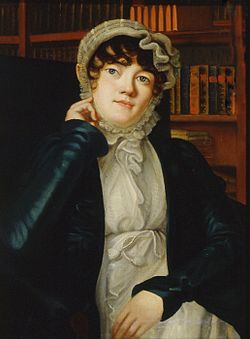Karolina Pavlova
| Karolina Pavlova | |
|---|---|
 |
|
| Born |
July 22, 1807 Yaroslavl, Russian Empire |
| Died | December 14, 1893 (aged 86) Dresden, Germany |
| Occupation | Poet & writer |
| Nationality | Russian |
Karolina Karlovna Pavlova (Russian: Кароли́на Ка́рловна Па́влова) (22 July 1807 – 14 December 1893) was a 19th-century Russian poet and novelist who stood out from other writers on account of her unique appreciation of exceptional rhymes and imagery.
Karolina Karlovna Pavlova (née Jänisch) was born in Yaroslavl. Her father was a German professor of physics and chemistry at the School of Medicine and Surgery in Moscow. Pavlova was homeschooled. Her Polish tutor, Polish poet Adam Mickiewicz (and consequently her first love), was "stunned by her literary talents." She was married in 1837 to Nikolai Filippovich Pavlov, who admitted he married her for her money. Pavlova had a son, Ippolit. For years they ran a brilliant literary salon in Moscow, that was visited by both Westernizers and Slavophiles. Pavlova’s husband gambled her inheritance away and began living with her younger cousin in another household he had set up. In 1853 Karolina’s and Nikolai’s marriage ended. She went to Saint Petersburg, where her father had just died in a cholera outbreak. From there she went to Dorpat (now Tartu, Estonia) to live with her mother and son. There she met Boris Utin, the "profoundest love of her life.” In January 1854, Pavlova's son went back to live with his father in Moscow and go to the university there.
Pavlova settled in Dresden, Germany in 1858. Aleksey Tolstoy visited Karolina, who was not only a poet but also a translator among Russian, French and German, in Dresden, and she translated his poetry and plays into German. He in turn secured a pension for her from the Russian government and corresponded warmly and solicitously with her until his death in 1875. Pavlova died in Dresden in 1893.
Although Pavlova’s poetry was ill accepted by her contemporaries, it was rediscovered in the 1900s by symbolists.Valery Bryusov combined Pavlova’s work into two volumes which he published in 1915. Karolina Pavlova was called the "master of Russian verse" by Andrei Bely, who placed her in the same category as Zhukovsky, Baratynsky, and Fet.
...
Wikipedia
